Manly Movie Week
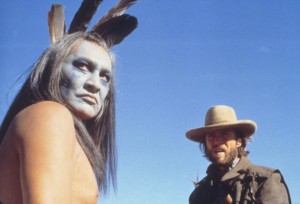 With my mother now in a rehab facility following her heart attack, I was less than comfortable with the idea of taking off on the scheduled family vacation. I encouraged my wife to go ahead and leave (she REALLY needed some time off from her stressful job) and take my daughter. Our tickets were non-refundable. My son had become increasingly reluctant to go because of the heavy homework load at his high school, so we two remained behind. Thus, early Saturday morning, my wife, my daughter, and my mother-in-law (who took my ticket) flew off to Orlando.
With my mother now in a rehab facility following her heart attack, I was less than comfortable with the idea of taking off on the scheduled family vacation. I encouraged my wife to go ahead and leave (she REALLY needed some time off from her stressful job) and take my daughter. Our tickets were non-refundable. My son had become increasingly reluctant to go because of the heavy homework load at his high school, so we two remained behind. Thus, early Saturday morning, my wife, my daughter, and my mother-in-law (who took my ticket) flew off to Orlando.
Ever since, my son and I have been watching manly movies. My wife, you see, has almost no patience for westerns (apart from The Magnificent Seven and Silverado). She is even less interested in WWII movies than westerns, and doesn’t much care for Clint Eastwood as well. As a result, on movie nights over the years there are a lot of manly movies my children haven’t seen.
I know my way around westerns fairly well, and I’ve shown both of my kids some of the greats over the years, including Sergio Leone’s/Eastwood’s “The Man with No Name” trilogy (you know, The Good, the Bad, and the Ugly, etc.) but neither of them have seen any of the great WWII movies.
I have fond memories of watching some WWII movies with my father, but it’s been 30 or so years since then, so my actual memory of them is a little dim. I consulted with my friends Eric Knight and John Chris Hocking, both WWII history and movie buffs. I combined their suggestions with my memories of movies I’d seen with my own dad, what was available via the public library or Netflix instant streaming, and wasn’t in common circulation on television any more, and put a list together, leaning a little toward movies with Clint Eastwood. And here’s what we’ve seen so far.
The Bridge on the River Kwai
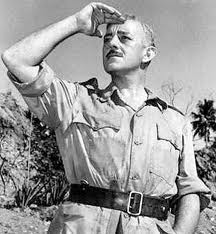 I hadn’t remembered much about this one apart from the ending, and the famous song, but I thought it was brilliantly scripted, acted, and filmed. It had quite an impact on my son, who was very impressed. Today you just don’t see bleak endings like that as often. It’s interesting to me how many of these older war movies actually have repercussions for their characters. Yes, they shows people doing brave things, but they also show a lot of people you like DYING. Perhaps that’s because many of the people acting, writing, and filming these stories were actual veterans.
I hadn’t remembered much about this one apart from the ending, and the famous song, but I thought it was brilliantly scripted, acted, and filmed. It had quite an impact on my son, who was very impressed. Today you just don’t see bleak endings like that as often. It’s interesting to me how many of these older war movies actually have repercussions for their characters. Yes, they shows people doing brave things, but they also show a lot of people you like DYING. Perhaps that’s because many of the people acting, writing, and filming these stories were actual veterans.
Curiously, the fellow who wrote the book this movie was based on is Pierre Boulle, who wrote something spec fic fans should know a lot better, The Planet of the Apes. He also took huge liberties with the actual events in the camp. For instance, the character of Saito was actually a decent man who was not abusive to the prisoners, enough that the real British POW commander vouched for him at his war crimes trial. And the real British officer wasn’t a martinet and quietly worked to sabotage things. Also, conditions at the prison camp were actually WORSE than those shown on film.
Schindler’s List
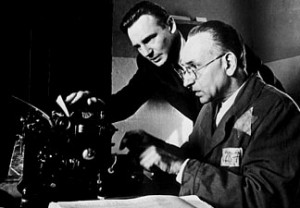 This is something I wanted my son to see, even though it’s an outlier to my list conditions: A.) My wife thought this movie was brilliant, she just wasn’t sure that she could ever see it again. B.) I never saw this one with my father, and I’m not sure we ever discussed it. C.) It’s not a manly action movie… except that it’s full of real heroism. So far this is my son’s favorite film from the whole batch, although we’ve agreed to keep this one in a class by itself.
This is something I wanted my son to see, even though it’s an outlier to my list conditions: A.) My wife thought this movie was brilliant, she just wasn’t sure that she could ever see it again. B.) I never saw this one with my father, and I’m not sure we ever discussed it. C.) It’s not a manly action movie… except that it’s full of real heroism. So far this is my son’s favorite film from the whole batch, although we’ve agreed to keep this one in a class by itself.
What can I say in praise of this movie that hasn’t already been said? It showed my son the horrors of WWII, the depths of humanity at its worst… and that one man CAN make a difference. I researched the actual events so we could talk about the movie afterward, and was surprised to learn that the character of Stern (Ben Kingsley) was actually an amalgam of two real men. Apart from the bit where Schindler breaks down at the end, most of the rest is horribly, horribly true.
I will probably watch this a final time with my daughter when she is old enough to see it.
Kelly’s Heroes
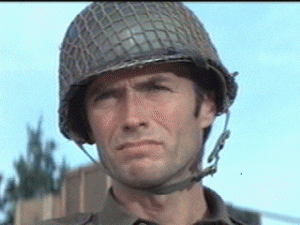 After Schindler’s List, my son kind of wanted to see some Nazis getting what was coming to them, although we did discuss that there were lot of Germans who weren’t Nazis. On watching Kelly’s Heroes, I saw nothing familiar, and am pretty certain I would have remembered it. That means there was a whole lot for me to enjoy, including the various plot developments and twists and action sequences, and even some comic bits. I thought the beginning was a bit rocky, and the rock song that they dropped into the movie three times was… well, rather than saying something unkind, I’ll just say it hasn’t aged well, and that it pulled me out of the movie the same way “Raindrops Keep Falling on My Head” always makes me wince in Butch Cassidy and the Sundance Kid.
After Schindler’s List, my son kind of wanted to see some Nazis getting what was coming to them, although we did discuss that there were lot of Germans who weren’t Nazis. On watching Kelly’s Heroes, I saw nothing familiar, and am pretty certain I would have remembered it. That means there was a whole lot for me to enjoy, including the various plot developments and twists and action sequences, and even some comic bits. I thought the beginning was a bit rocky, and the rock song that they dropped into the movie three times was… well, rather than saying something unkind, I’ll just say it hasn’t aged well, and that it pulled me out of the movie the same way “Raindrops Keep Falling on My Head” always makes me wince in Butch Cassidy and the Sundance Kid.
In this one I was expecting the characters would finally arrive and not get the treasure… but I was pleasantly surprised. And the twist at the end with the evil-looking SS tank commander was really nice.
The Great Escape
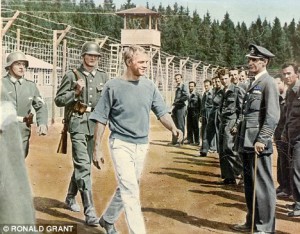 I remember watching snatches of this one with my father, although I had not recalled enough for the tension of the movie to be spoiled. Almost all of the names and many of the nationalities of the characters were changed from real life, but much of the rest of the movie is apparently dead-on, from the elaborate escape preparations to the brilliance, bravery, and ingenuity of the prisoners, to the general decency of the camp guards and officers. Once the prisoners of war got out of the camp, none of them escaped on a plane, and none of them escaped on a motorcycle, but the rest was just about right, including the way that the three men who made it all the way home accomplished it in real life.
I remember watching snatches of this one with my father, although I had not recalled enough for the tension of the movie to be spoiled. Almost all of the names and many of the nationalities of the characters were changed from real life, but much of the rest of the movie is apparently dead-on, from the elaborate escape preparations to the brilliance, bravery, and ingenuity of the prisoners, to the general decency of the camp guards and officers. Once the prisoners of war got out of the camp, none of them escaped on a plane, and none of them escaped on a motorcycle, but the rest was just about right, including the way that the three men who made it all the way home accomplished it in real life.
And that means that the way that 50 escaped prisoners of the war were murdered by the SS after recapture is also absolutely true. Apparently Hitler was so incensed that he ordered all to be killed, and then was talked down to “just” having 50 shot. So they were. He also decreed that all captured commandos were to be shot from hence forth, and so they were.
The reason that the camp commander was portrayed so decently is that the fellow he was based upon was apparently a decent man in real life, who treated his prisoners with respect, and who was viewed with respect by them in turn. The German camp was run by the Luftwaffe (German air force) not the SS. In real life, when the word of the 50 escaped prisoners having been “shot while escaping” was conveyed to the lead British POW officer in the camp (Murray), it was apparent to all concerned that they’d been murdered by the Gestapo, and the German commander’s adjutant sounded aghast as he spoke to Murray: ” You must not think the Luftwaffe had anything to do with this… we do not wish to be associated… it is terrible.”
The Desert Fox
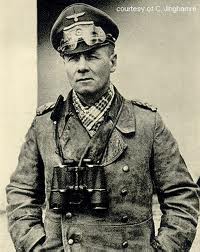 This was a mis-fire. I had only remembered that it was the first movie that ever started directly, before the credits rolled, and that there was a daring commando raid to try to kill Rommel at the beginning… And that’s about all we really get, except for one scene of Rommel being strictly scrupulous about the Geneva Convention’s treatment of prisoners, and the fact that he was admired and respected even by his enemies. Most of the rest of the movie is a rather slow stage play about how Rommel decides to throw in with the assassination attempt on Hitler. Rommel viewed himself as a soldier, not a politician. But the movie, apart from James Mason’s compelling portrayal of Rommel and Luther Adler’s inspired version of Hitler, didn’t give either my son or me what we’d wanted to see, and we stopped before the very end.
This was a mis-fire. I had only remembered that it was the first movie that ever started directly, before the credits rolled, and that there was a daring commando raid to try to kill Rommel at the beginning… And that’s about all we really get, except for one scene of Rommel being strictly scrupulous about the Geneva Convention’s treatment of prisoners, and the fact that he was admired and respected even by his enemies. Most of the rest of the movie is a rather slow stage play about how Rommel decides to throw in with the assassination attempt on Hitler. Rommel viewed himself as a soldier, not a politician. But the movie, apart from James Mason’s compelling portrayal of Rommel and Luther Adler’s inspired version of Hitler, didn’t give either my son or me what we’d wanted to see, and we stopped before the very end.
What we’d REALLY wanted to see was Rommel’s actual tactical brilliance (probably too expensive to film on a small budget) and more dramatization of the reasons he was viewed by the Allies with respect and even admiration. It had been a long time since I did any research about Rommel, so I dug in. I discovered what seemed a bevy of articles contradicting his portrayal as a noble and chivalrous soldier, then, doubtful of the information, dug further and realized that they could be tracked to a single slanted source and a documentary based upon it. Like the Nazis themselves used to say, if you lie big enough and make enough insinuations, people will believe you. In Rommel’s case it’s so hard to believe in a German commander who wasn’t a douchebag that it’s easy for people to assume him as evil as most famous (infamous) German high ranking officials from WWII.
But the facts seem still to be in place. No member of Rommel’s Arika Korps was ever brought up on war crimes. Rommel completely ignored any orders he found distasteful — for instance, the order to shoot all Jewish prisoners of war, and all captured commandos. As a matter of fact, he ordered that a British commando, Geoffrey Keyes, killed while trying to assassinate him, be buried with full military honors, then had the ceremony and grave site photographed so that the officer’s widow would know that the body had been properly interred.
In the desert it was challenging to know where the enemy lines began and ended, and once his column came upon a field hospital for New Zealand troops. Rather than arresting them, or something even more atrocious, Rommel inspected the camp, asked if they required any medical supplies, arranged for some to be sent to them, and drove the column away. He didn’t understand why Jewish soldiers had been removed from the rolls and wrote a letter of protest. He thought the best way to stop the anti-Semitic charges being raised against the Reich was to elevate some Jewish men to high positions of civil authority (this was obviously ignored). He completely ignored Hitler’s orders to deport Jews from France while he was building up Normandy’s defenses, and likewise refused orders to shoot captured Jewish civilians. His repeated letters protesting the treatment of Jews were all ignored. When building the Atlantic defenses of Normandy for the pending Allied invasion, contrary to standard “slave labor” practice of the Germans, he ordered the French civilians paid for their labor.
So, an honorable man who served his country, which, unfortunately for humanity, was run by evil and despicable men. Oh, and he was also a brilliant tactician, but I’ve gone on long enough already about him, so you can go read a book about that. Ye God, I now see I’ve talked more about Rommel than I have about any other entry on the list so far, and my son and I didn’t even finish the movie! Gifted military commanders fascinate me, so you’ll have to excuse my blathering. Moving along…
The Outlaw Josey Wales
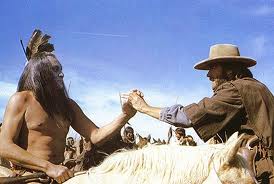 I had stronger memories of this one, which I’m sure I saw several times in reruns with my father. My son and I enjoyed it very much. The script was very strong. I had recalled Josey’s meeting with Ten Bears being really nicely done, and as an adult I liked it even more. So much so that after I sent my son to bed last night I watched the entire scene between Ten Bears and Josey Wales (Will Sampson and Clint Eastwood) two more times. What great dialogue.
I had stronger memories of this one, which I’m sure I saw several times in reruns with my father. My son and I enjoyed it very much. The script was very strong. I had recalled Josey’s meeting with Ten Bears being really nicely done, and as an adult I liked it even more. So much so that after I sent my son to bed last night I watched the entire scene between Ten Bears and Josey Wales (Will Sampson and Clint Eastwood) two more times. What great dialogue.
Apart from Schindler’s List, my son has judged The Outlaw Josey Wales to be his favorite of all the manly movies we’ve watched so far. I think that is probably because much of what we’ve seen are movies with big casts where you don’t get to know the characters as intimately, or where the characters are a little less fully realized. But it’s a damned fine movie.
UP NEXT
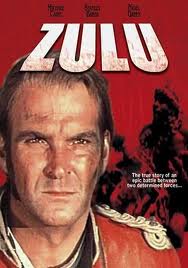 I’m going to steer away from the big cast pictures for the rest of the week, I think. The female half of the family returns Saturday morning, and the boy has lots of homework every night, so we’re running short on time. Here’s what I still hope to work in, possibly by having a late night marathon Friday:
I’m going to steer away from the big cast pictures for the rest of the week, I think. The female half of the family returns Saturday morning, and the boy has lots of homework every night, so we’re running short on time. Here’s what I still hope to work in, possibly by having a late night marathon Friday:
The Dirty Dozen
Hell is for Heroes (Hocking tells me it’s his favorite WWII film — I don’t recall it)
Where Eagles Dare
Morituri (Eric recommends this and The Train highly, neither of which I’ve seen)
The Train
To Hell and Back
Sergeant York (WWI, I know…)
…and of course, Zulu. Neither a western nor a WWII flick, nor a Clint Eastwood movie, I just can’t imagine a manly movie week without watching one of the greatest action movies ever filmed. Thinking back on it, I recall that the British officers hold the Zulu warriors in high regard because of their bravery and tactics, and that there’s no “white man’s burden” crap. These are just everyday soldiers, some 150 of them, fighting to survive against 3 to 4 THOUSAND Zulus. The highest ranking officer in charge was an engineer, not a field officer… how they survived makes for a gripping real-life story of heroism. Anyway, I hope I’m not stopped short by a bunch of racist claptrap.
We probably won’t have time for ALL of these. I’ve already had to cut The Longest Day, A Bridge too Far and Tora, Tora, Tora for lack of time.
6 Comments